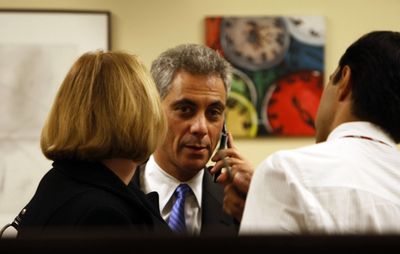Obama gets tough operator
Emanuel a product of Chicago politics

“Change” was Barack Obama’s campaign theme.
“Change … or else,” might be a better mantra for the political hardball players he has chosen for two key roles in his administration.
Rahm Emanuel on Thursday accepted Obama’s offer to make him chief of staff. Key sources also confirmed that Robert Gibbs, Obama’s bulldog of a senior aide, is in discussions about becoming the voice of the White House as its press secretary.
A White House presence for David Axelrod, Obama’s poetic but tough strategist, was also rumored Thursday as the longtime Obama friend and campaign mastermind considered moving from Chicago to Washington to play a key role in the administration.
Clearly, Obama is sending a no-nonsense message by naming Emanuel and considering Gibbs. While Obama intends to lead the nation as the hopeful, inspirational figure who soared to the pinnacle of American politics, he obviously has no intention of assuming a deferential position in the capital.
Both Emanuel and Gibbs are known as scrappy partisans, not at all shy about a tough fight – and certainly not worried about their reputations to that effect.
Emanuel, a Democratic congressman from Chicago’s North Side, once joked that the literal translation of his first name was “Go screw yourself.”
A Democratic operative a few months back described Gibbs, an Alabama native, as “Northern ruthlessness and Southern charm combined.”
Among many Democratic partisans these days, that’s as much a fond hope as a belief.
“This is not a town where people will give you what you want if you look good standing on the portico of the White House,” said Dee Dee Myers, Bill Clinton’s first press secretary and later a consultant to the TV series “The West Wing.”
Obama already displayed that he wasn’t naive, Myers said, when he decided to opt out of the public financing system for the campaign despite past support for the program. When the choice was between having millions and millions of campaign dollars at his disposal and maintaining a sunny symbolism, he chose the former.
“It’s really important to have someone who knows how the game is played. There are 435 people in the House and 100 people in the Senate who all have their own agenda,” Myers said. “The Clinton team came in less clear-eyed about the way Congress has its own agenda.”
Some might have harbored concern that Obama, with his message of inclusion and unity, would not be a fighter. Maybe those people missed the significance of Obama’s political upbringing in Chicago, where politics, as they say, “ain’t beanbag.” Perhaps they weren’t watching back in the early days, when he cleared the field of opponents by challenging their right to be on the ballot.
Things were becoming clearer by the end of Thursday, though, when Emanuel, and likely Gibbs, became part of the White House team.
Emanuel is a veteran of the White House, having worked as an aide in the Clinton administration. After winning election to the U.S. House in 2002, he has risen steadily through the ranks and is widely credited for the Democratic takeover of the chamber in 2006.
On Thursday Emanuel sounded a conciliatory note in a joint statement he released with Obama.
“I want to say a special word about my Republican colleagues, who serve with dignity, decency and a deep sense of patriotism,” Emanuel wrote. “We often disagree, but I respect their motives. Now is a time for unity, and Mr. President-elect, I will do everything in my power to help you stitch together the frayed fabric of our politics, and help summon Americans of both parties to unite in common purpose.”
Republicans were skeptical.
“Barack Obama’s first decision as president-elect undermines his promise to ‘heal the divides,’ ” said Alex Conant, a spokesman for the Republican National Committee. “Rahm Emanuel is a partisan insider who played a lead role in breaking Washington. … Our nation will be ill-served if Obama runs the White House the way ‘Rahmbo’ ran the Democratic Congress.”
The appointment of Gibbs likely will evoke a similar response if it becomes official. A top transition source says there has not been a formal offer or acceptance yet, but, as the dominant figure in Obama’s message discipline during the campaign, he would not be a surprising choice.
Gibbs worked on the early stages of Sen. John Kerry’s 2004 presidential campaign and has held numerous roles with other campaigns and on Capitol Hill. Since joining Obama’s Senate campaign in 2004, he has emerged as a commanding, influential figure within the senator’s inner circle.
Gibbs has long been someone viewed as being able to “speak the truth” to Obama, offering speaking and message discipline to the candidate. He also is known for his humor – and for a good fight.
“He knows how to ease the tension,” said a campaign staff member who has closely watched their relationship. “Barack implicitly trusts him.”
As the campaign wound on, Gibbs often found himself in front of the cameras, advocating for Obama on the television networks. That’s where one conservative commentator got a taste of his cutting style of debate.
Fox News host Sean Hannity asked Gibbs about Obama’s relationship with 1960s radical Bill Ayers.
Wearing his trademark faded jeans and a pink tie, Gibbs turned the tables on Hannity, asking the host whether he was an anti-Semite for once allowing an anti-Semite on his show. He got rave reviews from Democrats.
As Obama continues making plans for his new administration, he spent the day Thursday in Chicago making calls to world leaders and received an intelligence briefing. He’s planning to meet with top economic advisers today as well as hold a news conference.